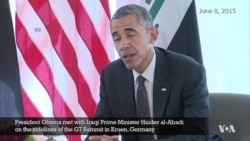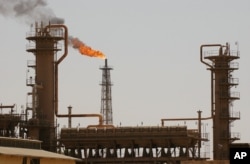The U.S.-led coalition fighting Islamic State militants is without a "complete strategy," President Barack Obama said Monday, pointing to what he categorized as a shortfall of security forces recruited in Iraq as a primary obstacle.
"We don't yet have a complete strategy, because it requires commitments on the part of the Iraqis as well," Obama said following the G7 summit in Germany, during which he also held talks with Iraq's Prime Minister Haider al-Abadi.
"All the countries in the international coalition are prepared to do more to train Iraqi security forces if they feel that additional work is being taken advantage of. What we're seeing is places where we've got more training capacity that recruits," he said.
Obama told reporters the speed at which Iraqi forces are trained and equipped has to be improved.
"Where we've trained Iraqi forces directly and equipped them...they operate effectively. Where we haven't, morale, lack of equipment, etc. may undermine the effectiveness of Iraqi security forces. So we want to get more Iraqi security forces trained, fresh, well equipped and focused," he said.
Obama said a big part of the Iraqi recruiting effort will be reaching out to Sunni tribes, who he says are not only willing and prepared to fight Islamic State, but have been successful at it.
But he said this outreach has not been as fast as it should be.
The president said another area where more progress is needed is stopping the thousands of foreign fighters pouring into Iraq and Syria to join the militants.
"A lot of it is preventable if we've got better cooperation, better coordination, better intelligence; if we are monitoring what's happening at the Turkish-Syria border more effectively."
The talks come less than a week after Abadi appealed for more help from members of a U.S.-led coalition that has conducted nearly a year of airstrikes in support of the Iraqi military. He reiterated the request Monday, telling the U.S. president, "Iraq cannot do it alone. It does not have the resources."
In Washington, Senator John McCain listened to President Obama's words and said he would like to see any strategy for fighting Islamic State include troops on the ground in Iraq. McCain said he has never seen the world more in crisis.
Control of Baiji
On Sunday, Iraqi forces made advances in Baiji, the oil refinery town Islamic State fighters seized for the second time earlier this year.
The Islamic State group has targeted oil production sites in Iraq and Syria, using the revenue to fund its operations in both countries as militants face resistance from pro-government forces, Kurdish militias, Syrian rebels and the U.S.-led airstrikes.
British Prime Minister David Cameron announced during the first day of the summit Sunday that Britain will send 125 more troops to Iraq to train local forces fighting the Islamic State group, bringing the total to 275 British personnel. The country's warplanes also are among the coalition partners involved in the ongoing air campaign against the militants.
Warplanes from the U.S.-led international coalition continue the nearly year-long bombing campaign against Islamic State, hitting militant positions in Syria with seven airstrikes overnight, and another 14 in Iraq.
In Washington Monday, Pentagon spokesman Colonel Steve Warren said "friendly forces" have started moving into the town of Baiji, where Islamic State fighters are inside the country's largest oil refinery.
Warren said the forces are rooting out the enemy. But he said it is too early to say the town has been liberated from the militants.
VOA National Security Correspondent Jeff Seldin contributed to this report.













